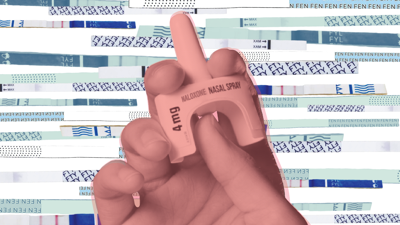Ten months ago, former Student Body President McKenzy Heavlin vetoed a Student Senate resolution that recommended making two doses of naloxone, a medication used to rapidly reverse the effects of an opioid overdose, available in campus residence halls and implementing naloxone and basic first aid training for resident advisors.
Stephen McGuiness, a fourth-year studying polymer and color chemistry and Student Senate president, told Technician at the time Student Senate would work hard to adapt and pass this resolution in the new session.
“It is kind of one of our biggest goals and kind of the top priority starting off this 103rd session,” McGuiness said in an interview with Technician after the resolution was vetoed.
Such resolutions don’t directly enact change, but encourage the University to do so.
“A resolution is essentially the Student Senate's opinion, or something that we want to see done,” McGuiness said. “While we have a very big stake in these appeals, [University administrators] don't necessarily have to listen to us.”
The original resolution was introduced by McGuiness, Sen. Naila Din, a second-year studying microbiology and Sen. Alyssa Price, a second-year studying genetics.
Din said one of the main reasons the resolution was vetoed at the time was because there was not enough communication with campus partners, and after it was vetoed, senators worked to discuss solutions with the University.
“We talked with Campus Health, we talked with Housing and we also talked with Prevention Services,” Din said.
Din said in a revised version of the resolution, some campus partners will likely play a larger role.
“Within our talks with Prevention Services, they seem to really focus on increasing training and increasing Narcan accessibility,” Din said. “So we might push out some piece of resolution that's in support of their plan.”
The original version of the resolution was focused on RAs. Din said Housing was worried that RAs could be held liable if it was a requirement of their position to administer naloxone and something went wrong.
“State legislation provides protection for student staff if [administering naloxone or giving first aid] is not a function of the position,” Din said. “If it is a requirement in that position, then there is some liability within it.”
When Heavlin vetoed the original resolution, he voiced concern that the resolution suggested distributing waivers for residents to indicate whether they consent to receiving basic first aid or naloxone administered by an RA. He said the consent waivers could bring up legal questions that would slow the implementation of the resolution.
Meghan Luzader, director of residence life, said in an email that Housing does not discourage RAs from getting naloxone training from NC State’s Prevention Services or to pursue other training if they wish to do so.
“Providing CPR and Narcan treatment to our residents is not a part of the job description for our RAs,” Luzader wrote. “We have trained EMS personnel on campus who can administer medication, Narcan, CPR, first aid, etc. We train our RA staff to call 911 or the campus emergency number to get help from those who are very experienced in administering these treatments.”
Luzader said Housing would not have enough time for optional naloxone training during RA training.
“We train our staff over approximately a week and a half in advance of move-in on a wide variety of topic areas,” Luzader said. “We have a lot of information to cover during this time frame to prepare our staff to be able to meet the requirements of their position.”
Price said the resolution's sponsors are now shifting the focus from increasing naloxone access for RAs to the greater campus population.
One challenge, however, is the cost of naloxone. A standard pack of two Narcan nasal sprays costs about $45.
Din said the University doesn’t have funds to pay for naloxone.
“There's just no grants for the University to specifically use for Narcan,” Din said. “It's just an issue funding-wise; they just didn't have enough money to provide free Narcan.”
Din said Prevention Services could donate 20 to 30 free doses of Narcan to SG, but it would need more in addition.
“So that's why we're looking for outside sources, like health departments near us,” Din said. “We want to ask them whether they are able to donate Narcan or to donate money.”
Din said she and Price also want to create a GoFundMe where all the proceeds go directly to purchasing Narcan.
Din said she and Price are still working on the new version of the resolution. She said they’ve had to talk to many campus partners, think a lot about what they wanted to change about the resolution and also have lives outside of SG.
“And we're all students; we got to take care of ourselves while also trying to tackle these issues,” McGuiness said. “So I believe that's just the nature of it.”
Din said that they plan to introduce the new version of the resolution this session of Student Senate before mid-March 2024.


(0) comments
Welcome to the discussion.
Log In
Keep it Clean. Please avoid obscene, vulgar, lewd, racist or sexually-oriented language.
PLEASE TURN OFF YOUR CAPS LOCK.
Don't Threaten. Threats of harming another person will not be tolerated.
Be Truthful. Don't knowingly lie about anyone or anything.
Be Nice. No racism, sexism or any sort of -ism that is degrading to another person.
Be Proactive. Use the 'Report' link on each comment to let us know of abusive posts.
Share with Us. We'd love to hear eyewitness accounts, the history behind an article.